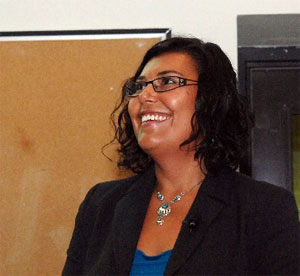 |
| Marcia Anderson presented the Weld Kernohan Lecture at ║┌┴╧│╘╣╧═ЇMedical School.┬а(Danny Abriel Photo) |
Medical students, doctors, aboriginal leaders, and others recently gathered to learn about indigenous health issues in Canada and how they relate to medical education across the country.
Marcia Anderson, the president of the Indigenous Physicians Association of Canada, says there are fundamental societal and policy shifts that must take place before indigenous peoples have full and equal medical care.
тАЬWe need to understand that indigenous health and indigenous health inequities are not about individual choices or lifestyle choices or biological inferiority,тАЭ said Dr. Anderson. тАЬWe need to understand them as a reflection of the fairness of historical and current social, economic, and health policy.тАЭ
Within the indigenous population, suicide rates are higher than the general population, thereтАЩs an increased incidence of sexually transmitted infections, and hospitalization rates are four to five times that of other groups. The World Health Organization recognizes that indigenous peoples are also at four to five times greater risk of severe illness.
Recently in Canada, aboriginals have been disproportionately affected by H1N1 influenza. Of the 889 cases of H1N1 in Manitoba, for example, 37 per cent affected the aboriginal population. Fifty per cent of intensive care beds were occupied by First Nations patients.
Dr. Anderson emphasized that medical schools across Canada are in a unique position to improve indigenous health, and she hopes ║┌┴╧│╘╣╧═ЇMedical School will become a leader in reforming indigenous health outcomes in the region. By reaching out to prospective indigenous students and being linked into aboriginal communities throughout Nova Scotia, New Brunswick, and Prince Edward Island, Dr. Anderson pointed out that ║┌┴╧│╘╣╧═ЇMedical School would be better able to respond to the needs of its Maritime community.┬а тАЬMany indigenous people donтАЩt understand their own health just in terms of themselves,тАЭ she explained. She said strong families and communities are important factors in indigenous wellbeing.
┬атАЬOur ambitious plans for curricular renewal and our expansion throughout the Maritimes, position us to respond to Dr. AndersonтАЩs challenge,тАЭ said Dr. Preston Smith, ║┌┴╧│╘╣╧═ЇMedical SchoolтАЩs senior associate dean of regional and rural medical education. тАЬWeтАЩre in a unique opportunity to better serve our aboriginal community.тАЭ
A 2002 graduate of the University of ManitobaтАЩs medical school, Dr. Anderson visited ║┌┴╧│╘╣╧═Їto deliver the Weld Kernohan Lecture тАУ a lecture dedicated to the memory of ║┌┴╧│╘╣╧═ЇMedical School graduates Dr. Elizabeth Weld and Dr. Mary Kernohan. SheтАЩs an assistant professor of community health sciences and internal medicine at the University of Manitoba, and is the medical lead of the Population Health Promotion Unit at ManitobaтАЩs ministry of health. With a masterтАЩs in public health from Johns Hopkins, sheтАЩs also heavily involved in Canadian public health policy and education.
